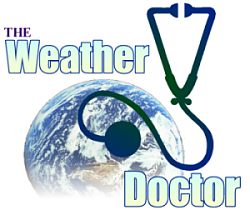 |
 |
| Home | Welcome | What's New | Site Map | Glossary | Weather Doctor Amazon Store | Book Store | Accolades | Email Us |
 | |||||||||||||
Weather Almanac for November 2002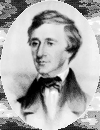
HENRY DAVID THOREAU: |
|||||||||||||
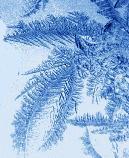 |
| "That glaze! I know what is was by my own experience; it was the frozen breath of the earth upon its own beard." |
As a naturalist Henry David Thoreau filled his journals with astute and detailed observations, many of which have been collected in posthumous publications (The Maine Woods, Cape Cod, A Yankee in Canada, The Illustrated World of Thoreau, In Wildness is the Preservation of the World, etc.). In addition to his journals, Thoreau keep a series of "Fact Books" in which he collected the writings and research of others on topics that interested him. Among the Fact Book entries can be found accounts of local weather and climate and weather extremes. Henry David hand-copied sections of Lorin Blodget's Climate of the United States (1847) and William Bradford's contemporary account of the Great Hurricane of 1635 into these books.
Henry David Thoreau was above all a New Englander — by birth and by choice. And he said that "I have never known a genuine Yankee who did not start the day and finish it by glancing first at the thermometer, next at the sky and then making a prediction."
Like many of us who take an interest in watching the sky for signs of changing weather and become known as a local weather prophet, Henry David was similarly regarded in Concord. In 1858, he wrote:
"When I came down-stairs this morning, it raining hard and steady, I found an Irishman sitting...in the kitchen, wainting...to inquire what I thought the weather would be today!"
Thoreau was a keen student of weather lore and weather signs and recorded in his Fact Books weather signs gathered from local native tribes, farmers and others. Though most of his interest focused on Concord area lore, he collected weather wisdom from other regions as well, including those from the classic texts of Virgil and Theophratus.
On Cape Cod, for example, he met an old man who "thought he could tell all about the weather from the sounds which the sea made, noting a particular roar of the sea before the wind changes."
Thoreau declared himself "self-appointed inspector of snowstorms and rainstorms." He faithfully observed and recorded other weather phenomena as well — a poetic chronicler of the state of sky and weather impacts. He anointed snow "the great revealer" because he believed it contained all the hieroglyphs of weather wisdom the softer seasons concealed.
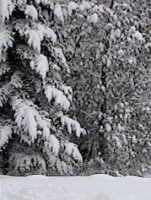 Winter appeared to be his favourite season for its stark beauty.
Winter appeared to be his favourite season for its stark beauty.
"So sweet and wholesome is the winter, so simple and moderate, so satisfactory and perfect. ...It is solid beauty."
Many of his journal and Fact Book entries suggest that Thoreau could never fully escape the lure of the sciences because the need to know "why?" was too strong. In this regard, he strayed from the transcendentalist doctrine that the principles of reality were to be discovered through thought, intuition and spirituality rather than the empirical study using data and experimentation. Thoreau, it appears, was a transcendentalist only when the spirit moved him.
Elsewhere (The Elders Speak: Thoreau on Weather), I present some of my favourite Henry David Thoreau weather-related writings and observations. Here are but a few tastes of Thoreau:
"On land, only the grass and trees wave, but the water itself is rippled by the wind. I see the breeze dash over it in streaks and flakes of light."
"The thin snow driving from the north and lodging on my coat consists of those beautiful star crystals, no cottony and chubby spokes,...but thin and transparent crystals."
"The air has resumed its voice, and the lightning, like a yellow spring flower, illuminates the dark banks of clouds."
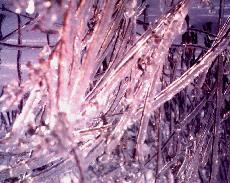 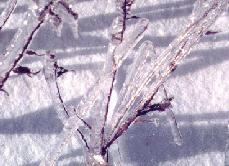 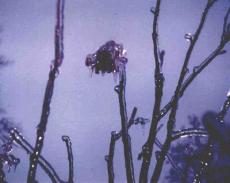 |
"Where yesterday was a plain smooth field, appears now a teeming crop of fat, icy herbage....The straight stems of grasses stand up like white batons or scepters...Some weeds bear the ice in masses, some, like the trumpetweed and tansy, in balls for each dried flower. What a crash of jewels as you walk!..." |
I have not intended in this piece to show that Henry David Thoreau was a true scientist, even for his day. He was an astute and curious observer of the natural world around him, a common trait for many who enter the world of science. And I am one of them. The philosophy Thoreau developed in Walden had a profound influence on my life. But, his poet's eye and pen also forced me to see the living world behind the science theories, and for that I dedicate this site to his memory.
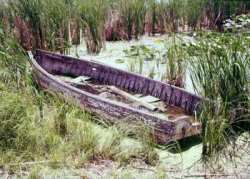 |
To Purchase Notecard, |
Now Available! Order Today! | |
 |
 |
NEW! Now |
The BC Weather Book: |


